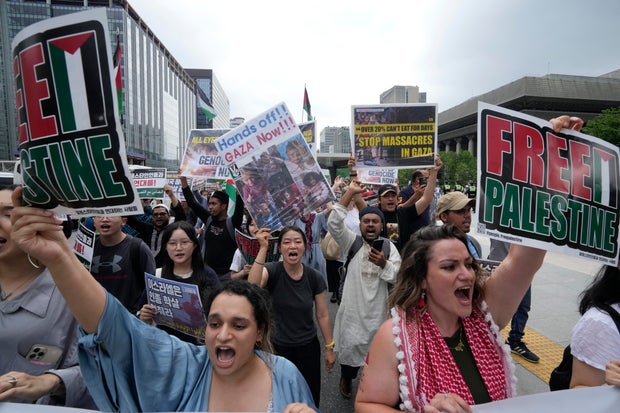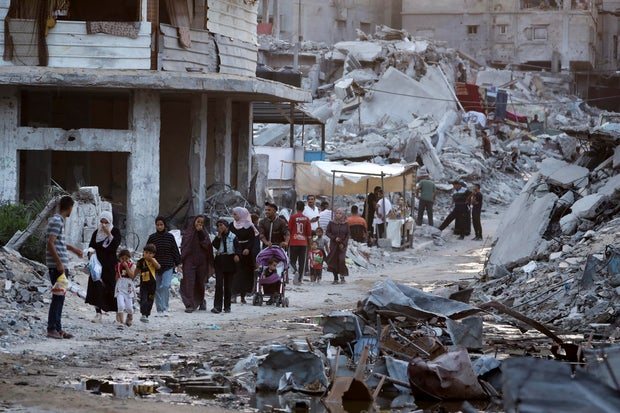[ad_1]
There is new hope for a cease-fire deal in the Middle East after Hamas responded to a U.S.-backed proposal for a phased deal in Gaza.
The militant group – which controlled Gaza before triggering the war with an Oct. 7 attack on Israel – has reportedly given initial approval of the cease-fire deal after dropping a key demand that Israel give an up-front commitment for a complete end to the war, a Hamas and an Egyptian official told the Associated Press on Saturday.
A senior U.S. official says that Hamas’ response to the proposal “may provide the basis for closing the deal.”
The apparent compromise could deliver the first pause in fighting since November and set the stage for further talks on ending the devastating nine months of fighting. But all sides cautioned that a deal is still not guaranteed.
The two officials, who spoke on condition of anonymity to discuss ongoing negotiations, told the Associated Press that Washington’s phased deal would first include a “full and complete” six-week cease-fire that would see the release of a number of hostages, including women, older people and the wounded, in exchange for the release of hundreds of Palestinian prisoners. During the 42 days, Israeli forces would withdraw from densely populated areas of Gaza and allow the return of displaced people to their homes in northern Gaza, the officials said.
Over that period, Hamas, Israel and mediators would negotiate the terms of the second phase that could see the release of the remaining male hostages, both civilians and soldiers, the officials said. In return, Israel would free additional Palestinian prisoners and detainees. The third phase would see the return of any remaining hostages, including bodies of dead captives, and the start of a years-long reconstruction project.
Ahn Young-joon / AP
Hamas still wants “written guarantees” from mediators that Israel will continue to negotiate a permanent cease-fire deal once the first phase goes into effect, the officials said.
The Hamas representative told The Associated Press the group’s approval came after it received “verbal commitments and guarantees” from the mediators that the war won’t be resumed and that negotiations will continue until a permanent cease-fire is reached.
“Now we want these guarantees on paper,” he said.
In line with previous proposals, the deal would see around 600 trucks of humanitarian aid entering Gaza daily — including 50 fuel trucks — with half of them bound for the hard-hit northern of the enclave, the two officials said. Following Israel’s assault on the southernmost city of Rafah, aid supplies entering Gaza have been reduced to a trickle.
Israel launched the war in Gaza after Hamas’ October attack in which militants stormed into southern Israel, killed some 1,200 people — mostly civilians — and abducted about 250. Israel says Hamas is still holding about 120 hostages — about a third of them now thought to be dead.
Since then, the Israeli air and ground offensive has killed more than 38,000 people in Gaza, according to the Hamas-run Health Ministry, which does not distinguish between combatants and civilians in its count. The offensive has caused widespread devastation and a humanitarian crisis that has left hundreds of thousands of people on the brink of famine, according to international officials.
Months of on-again off-again cease-fire talks have stumbled over Hamas’ demand that any deal include a complete end to the war. Prime Minister Benjamin Netanyahu has offered to pause the fighting but not end it until Israel reaches its goals of destroying Hamas’ military and governing capabilities and returning all hostages held by the militant group.
Netanyahu’s office did not respond to requests for comment, and there was no immediate comment from Washington.
CBS News previously reported that an Israel delegation headed by Mossad Director David Barnea was traveling to Qatar for talks. Sources told CBS News that Barnea was set to meet with Qatari Prime Minister Sheikh Mohammed bin Abdulrahman Al Thani for discussions.
On Friday, the Israeli prime minister confirmed that the spy agency’s chief had paid a lightning visit to Qatar, a key mediator. But his office said “gaps between the parties” remained.
President Biden held a 30-minute call with Netanyahu on Thursday, a senior Biden administration official told reporters, during which the two leaders walked through the latest draft of the proposal.
U.S. officials have said the latest proposal has new language that was proposed to Egypt and Qatar on Saturday and addresses indirect negotiations that are set to commence during the first phase of the three-phase deal that Mr. Biden laid out in a May 31 speech.
Hamas has expressed concern Israel will restart the war after the hostages are released. Israeli officials have said they are worried Hamas will draw out the talks and the initial cease-fire indefinitely, without releasing all the hostages.
Netanyahu is under pressure from Israel’s closest ally – the United States – to negotiate a ceasefire, but at home, two far-right wing members of his cabinet have threatened to bring down the governing coalition if he agrees to a truce.
Israel bombardment continues
The Hamas-run Interior Ministry said four police officers were killed in an Israeli airstrike Saturday in Rafah, the AP reported. The ministry, which oversees civilian police, said the officers were killed during foot patrol securing properties. It said eight other police officers were wounded. Israel’s military did not immediately respond to questions.
In Deir al-Balah, prayers were held for 12 Palestinians, including five children and two women, killed in three separate strikes in central Gaza on Friday and Saturday, according to hospital officials. The bodies were taken to al-Aqsa Martyrs Hospital, where AP journalists counted them.
Two of those killed in a strike that hit the Mughazi refugee camp Friday were employees with the United Nations agency for Palestinian refugees, the organization’s director of communications told the AP. Juliette Touma said a total of 194 workers with the agency have been killed since October.
Jehad Alshrafi / AP
Earlier this week, an Israeli evacuation order in the southern city of Khan Younis and the surrounding areas affected about 250,000 Palestinians. Many headed to an Israeli-declared “safe zone” centered on the Muwasi coastal area or Deir al-Balah.
Ground fighting has raged in Gaza City’s Shijaiyah neighborhood for the past two weeks, forcing tens of thousands of people to flee their homes. Many have sheltered in the Yarmouk Sports Stadium, one of the strip’s largest soccer arenas.
[ad_2]
Source



Leave a Reply